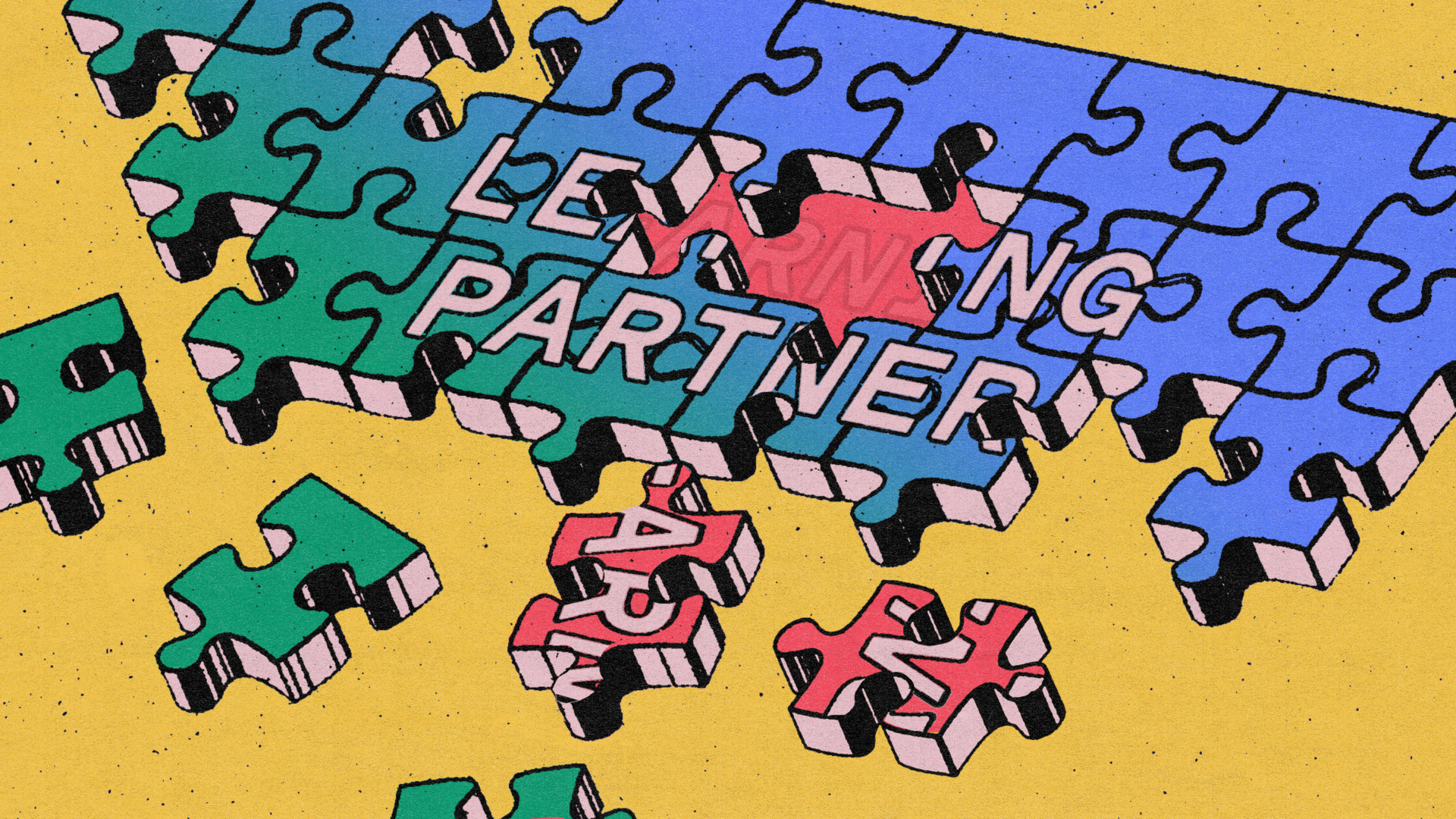The right learning partners can unlock your organization’s potential. But the truth is, starting a new relationship with a vendor can be overwhelming—there’s a lot at stake when you bring in a new learning partner.
When done right, a new learning partnership can result in real impact and a lasting relationship. When a partnership goes wrong, it can lead to wasted time and money, and it may damage trust between you and your team, learners, and stakeholders. With stakes that high, what criteria should you consider to ensure you have the right partner in learning?
We’re going beyond the typical checklist of vendor capabilities and delving into the nitty gritty of what makes the most successful learning partnerships tick. Here’s what to consider to find your next great learning partner.
Learning strategy and execution capabilities
Start with the most critical piece of the learning-partner puzzle: value.
According to a recent Brandon Hall Group study, the biggest challenge companies face in ensuring effective learning programs is that the “organization does not have the people, time, and financial resources to support future skills development needs.” Seeking outside help is critical to solving this problem, but finding the right learning partner—one who has the strategy and execution chops to help you reach your goals—is easier said than done.
You want a learning partner that delivers value by creating real, measurable behavior change. If they can’t point to a tangible difference that their learning interventions create, then you probably shouldn’t hire them. You also want a partner that has the right expertise in the areas that are most important to your goals. Take the time to vet a potential partner’s ability to execute by reviewing work samples. Are they creating experiences as beautiful and high quality as they are effective?
Here’s a quick list of what these strategic and development capabilities look like in practice:
- Able to understand your industry, business, and goals and collaborate effectively with your internal team
- Has industry-leading strategy, design, engineering, and media talent
- Builds their learning strategy around well-established goals and ties it to business outcomes
- Has a clear plan for measuring outcomes
- Focuses on the learner environment and experience
- Demonstrates expertise in learning strategy, adult learning theory, and emerging trends
- Brings new, strategic thinking to the table instead of serving as order-takers
Remember, this piece is foundational for finding the right learning partner. Don’t breeze past this—it might be the most obvious criteria, but it’s also the most important.
Operational excellence
Once you’ve vetted a potential partner in learning for their ability to do the work, it’s equally important to evaluate how that work will get done—do they have the ability to execute a quality learning strategy? Operational excellence is defined differently across organizations and their standards might be lower than your own. Do your due diligence to find a partner who works with the same commitment to quality and communication as you do. It’s a factor that’s often overlooked, but you’ll feel the pain of operational misalignment once your project is underway.
Let’s review a few key traits of a learning company with operational excellence.
Reliable and professional
You want a reliable partner who delivers what they say they will when they say they will—while staying on time and on budget. Great learning partners are professional, organized, and proactive communicators. Ideally, your new learning partner will also have a big-picture mindset that fosters flexibility and responsiveness. If it’s what best serves the project’s goals, they find a way to make it work.
On budget
This is key: nobody wants surprises after agreeing to a project budget. Great learning partners know how to scope accurately and stick to what they promised. They don’t make a habit of issuing change orders for small requests—they’re flexible and fair.
An excellent customer experience
Great learning partners help expand the bandwidth of your team and become a true extension of it by bringing new expertise and capabilities to the table. We’ve all heard nightmare stories of bringing on a vendor that ends up creating more work for you and your team. Great learning companies focus on creating an excellent customer experience, from onboarding to post-launch reporting.
A proven process in place
Look for learning partners that have a solid, well-oiled, and proven process in place. Their process should include some version of these critical steps:
- Discovery and learner research
- Setting objectives and identifying key metrics
- Brainstorming and concepting & prototyping and/or validation
- Program design and execution
- Post-launch reporting on key metrics + optimization recommendations
Intentionally innovative
Innovation is a word that gets tossed around a lot—what does it really mean to be innovative? And why does it matter in learning? Without innovation, learning companies can fall into the trap of churning out the same, repackaged solutions time and again and never trying anything new. That can leave you with a cookie-cutter solution that doesn’t solve your unique and specific problem. You don’t want order-takers, you want a trusted partner that listens to you. But innovation without intention can lead to different problems—like chasing trends and opting for flashy tools that don’t match the job.
Instead, you want a partner that strikes the right balance. A great learner partner is creative, but with a purpose. Innovation should be baked into their strategy—do they systematically explore and evaluate new trends? Can they sift through the smoke and mirrors to identify the best solution? Are they constantly building their skills to expand their capabilities?
With an intentionally innovative partner, you can avoid the cookie-cutter trap and know you’re always getting a solution that’s been customized to solve your problem.
Are you evaluating potential learning partners?
In this guide, 16 Key Questions to Ask Potential Learning Partners, we’re sharing the most important areas to discuss with a potential partner to help you decide if they’re the right fit. We’re delving deeper than the typical checklist and sharing ideas and questions you likely haven’t considered before so you can find a partner that really gets it (and you).
16 Key Questions to Ask a Potential Learning Partner→Values alignment
A great learner partner is value-aligned with you and your organization’s needs. A misalignment in values can create friction throughout the project and more than likely, you’ll be stuck with a final product that doesn’t meet expectations. Here are a few key values that great learning partners hold.
Impact
Your learning partner should be laser-focused on creating a solution that drives impact. This means they’re collaborative problem-solvers, they’re empathetic, and they’re just as invested in solving the learning problem as you are.
People come first
What if checking in with your learning partner was the best meeting of your day? With great learning partners, you actually like the people you’re working with—if it’s a slog to get through the work with them, it isn’t the right fit. Great learning partners are made up of teams of creative, thoughtful, and learning-obsessed people that are just fun to be around.
Flexible
Options, options, options. If your learning partner has a one-track mind on which solution is best for your learners, run. A great learning partner will bring multiple strategic options to the table and work with you to rank them depending on how you’re prioritizing the cost, quality, and time involved in the project.
High-quality design
Learning works best when beautifully designed. That includes aesthetics, but there are multiple dimensions to design and it’s more than simply making something “look good.” Strategic design should be a priority in learning, so look for a partner with the capabilities to create a consumer-grade, cohesive user experience complete with smart instructional design and polished visuals.
The right strategic partner helps you achieve real change
Ultimately, choosing a learning partner is the start of a new relationship. Treat it with the same care and due diligence you would any important relationship in business or life. You want a partner you can trust, who helps you and your team achieve your goals, and who you genuinely want to be around. The right strategic partner can help you unlock your team’s potential and go further, together.
We bet we check all of your boxes.
Let’s find out—schedule a casual conversation with one of our learning strategists. We’ll discuss your current learning challenges and share insights on a potential strategic direction.
Let’s talk!→
